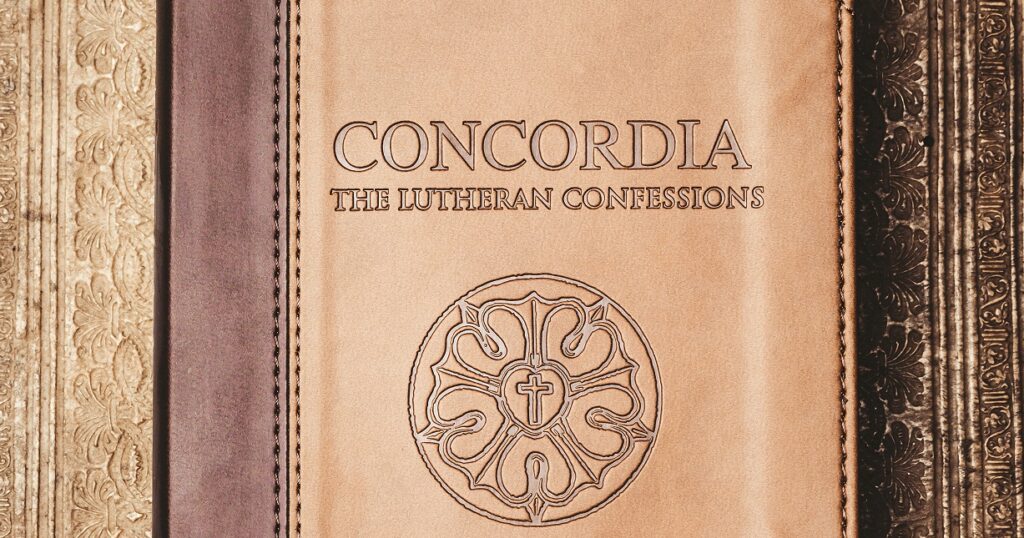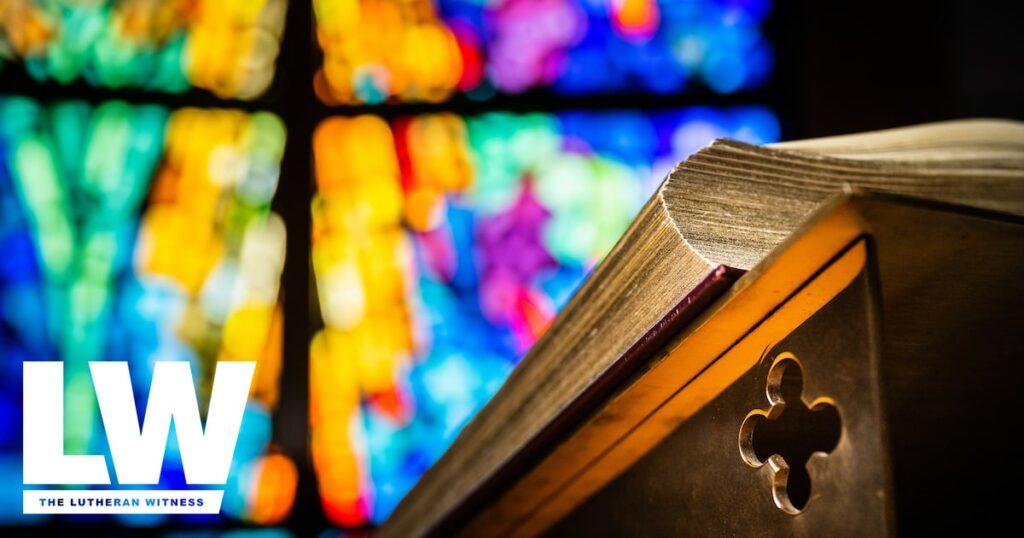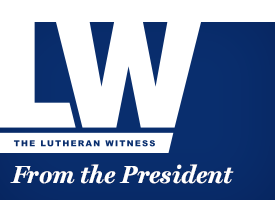by Matthew C. Harrison
Dear Brothers and Sisters in Christ!
The orthodox Lutheran church of all times and places confesses the verbally inspired and inerrant Scriptures to be the very Word of God and “the only source and norm” for all teaching and preaching. Every one of our 6,000 LCMS congregations, every pastor, teacher, DCE, deaconess and church worker, every LCMS entity (whether the Concordia Plans, Lutheran Church Extension Fund, Lutheran Hour Ministries, Lutheran Women’s Missionary League, Lutheran Federal Credit Union), every preschool, grade school, high school, and every university is pledged to this truth. Those who believe in Jesus recognize His words and voice in Holy Scripture. “My sheep hear my voice” (John 10:27). “The Scripture cannot be broken” (John 10:35). This is asserted in every ordination, installation and consecration service. Every LCMS teacher and institution makes this pledge. Faith in Christ’s vicarious (for us) life, death and resurrection is not compatible with a smorgasbord approach to Christianity. Our culture has gone mad. There are well-meaning but misled individuals also among us who would like to put a veil over what Jesus says about marriage (Matt. 19 — one man, one woman) or quietly snip the “unwoke” bits — like Romans 1 — out of the Bible. “Too much doctrine,” they say.
But we are also pledged — every one of us — to the 1580 Book of Concord. This issue of The Lutheran Witness is all about our public confession. Other great churches are focused on their form of governance (Rome, Anglicanism), the authority of their liturgy (Eastern Orthodoxy), or the Bible over against the ecumenical creeds (Baptists). We Lutherans recognize the Scriptures and the Lutheran Confessions. To be a Lutheran is to confess that the catechism rightly interprets the Bible. And our Book of Concord further elaborates the faith of Luther’s catechism (Ten Commandments, Creed, Lord’s Prayer, Baptism, Absolution, Lord’s Supper) in the face of wrong interpretations of the Bible.
Thus, we confess the Book of Concord to be “a true exposition of the Word of God.” One may believe that the catechism gets wrong what the Bible teaches, but he will have to do that outside of the Lutheran church, particularly if that person is a called pastor or servant of the church. This is solemn, serious business. It may be rarely acknowledged and is often violated, but in our confirmation vows, we promise to uphold the faith of the Bible and Small Catechism and suffer all, even death, rather than depart from it. Pastors do the same in ordination and installation vows. “I make these Confessions my own because they are in accord with the Word of God” (LSB Agenda, p. 166; emphasis added).
Our confession of the Gospel of Christ and all its articles of faith is done in view of eternity. “Everyone who acknowledges me before men, I also will acknowledge before my Father who is in heaven,” says Jesus (Matt. 10:32).
Luther knew well that rascals would come after he died and lie about what he really taught, especially about the Lord’s Supper. Before he died, he penned his Confession concerning Christ’s Supper. And then he added,
Hence if any one shall say after my death, “If Luther were living now, he would teach and hold this or that article differently, for he did not consider it sufficiently,” etc., let me say once and for all that by the grace of God I have most diligently traced all these articles through the Scriptures, have examined them again and again in the light thereof, and have wanted to defend all of them as certainly as I have now defended the sacrament of the altar. I am not drunk or irresponsible. I know what I am saying, and I well realize what this will mean for me before the Last Judgment at the coming of the Lord Jesus Christ. Let no one make this out to be a joke or idle talk; I am in dead earnest, since by the grace of God I have learned to know a great deal about Satan. If he can twist and pervert the Word of God and the Scriptures, what will he not be able to do with my or someone else’s words? (LW 37:360–61)
Right now, we Lutherans stand before Christ clothed in His sacred righteousness. Yes, there are Christians wherever the true Jesus is believed and confessed, thank God. But we confess the true faith in the true God in all its Gospel-filled truth and purity. And so we confess along with the authors of our Book of Concord:
If you confess with your mouth that Jesus is Lord and believe in your heart that God raised him from the dead, you will be saved. For with the heart one believes and is justified, and with the mouth one confesses and is saved. For the Scripture says, “Everyone who believes in him will not be put to shame.” (Rom. 10:9–11)
With the authors of our Book of Concord and faithful teachers in the generations since, we confess the truth of Christ and His Word before an unbelieving world. With this confession, on the Last Day we will stand before Christ without fear.
In the sight of God and of all Christendom ‹the entire Church of Christ›, we want to testify to those now living and those who will come after us. This declaration presented here about all the controverted articles mentioned and explained above — and no other — is our faith, doctrine, and confession. By God’s grace, with intrepid hearts, we are willing to appear before the judgment seat of Christ with this Confession and give an account of it [1 Peter 4:5]. We will not speak or write anything contrary to this Confession, either publicly or privately. By the strength of God’s grace we intend to abide by it. Therefore, after mature deliberation, we have, in the fear of God and by calling on His name, attached our signatures with our own hands. (FC SD Conclusion 40)
–Pastor Harrison






My wife and I joined an LCMS church in September, 2020. I ministered/pastored in other Christian denominations/fellowships for over 45 years. I believe that in the LCMS I have found my home. Matthew Harrison’s piece above resonates 100% with my spirit precisely because it resonates 100% with the Word of God. I thank God that there is a place where the Word of God and the Sacrament is honored every Sunday morning and where pastoral leadership is demonstrated consistently in the name of Jesus.
I agree with everything you said. But In reality, I wonder why many pastors from the LCMS whose sermons I have heard over the years, rarely mention the Confessions, the Book of Concord, or the madness of the times in which we live. Rarely a mention of abortion, same sex marriage, or timely issues affecting the church. A short sermon with the pablum of superficially, a quick spoonful of the milk of the Word, and the congregation remains still hungry and is not fed as they should. The problems of which you speak should be addressed in the Pulpit more frequently. Soli Deo Gloria
Thank you
A Scenario and a Question
In the rite of confirmation, a 13-year-old is received into communicant membership on account of his professed agreement with Luther’s Small Catechism.
Decades later, he starts reading another part of the Book of Concord and comes across a seemingly minor assertion that is not substantiated by a Bible reference and not found anywhere in the Small Catechism. He determines that he cannot in good conscience agree with that particular assertion in light of some Bible verses that he can readily cite. And there he stands; he can do no other.
This man is an active lay member of an LCMS congregation. Should he resign his membership?
Paul, I have no right to speak, and claim ignorance of theology and the schools of thought which emerged from the Reformation. I am just an ordinary Lutheran, with no pastoral training. Yet, your scenario seems to echo with my own viewpoint as well. I think that we must first acknowledge that our understanding of scripture, as fallen creatures, still contains mixtures of truth and error. Luther would agree, as he always pointed us to the word of God over human interpretations, sometimes open to debate. There is no shame in being unsure about scriptural meanings. Often Christians agree to disagree on such matters. The core foundational principles and doctrines we regard as immutable truths, but in some cases a combination of figurative language, context, linguistic use, translation between Greek, Hebrew, Aramaic can lead to disagreements. In the case you described, I do not think the active lay member should resign his membership. In many ways, we can all be accused of misinterpretations of scripture in light of select passages of the Book of Concord. Soli Deo Gloria.